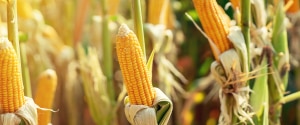
Can Dogs Eat Corn?

We all want the best for our dogs. And lately, you may have heard discussion regarding corn in dog food. Since there’s so much misinformation floating around, you may be wondering, “can dogs eat corn?” We think you should know the real facts before you decide what you believe about dogs and corn.
Are dogs able to eat corn?
Absolutely. Our research and expert nutritionists have shown us that corn in dog food is not only acceptable in a dog’s diet, but also beneficial to their health. However, there is a lot of unscientific literature raising a range of questions like: can dogs have corn, is corn good for dogs, or even is corn bad for dogs? Getting facts from experts based on research is key to forming your opinion.
Is corn bad for dogs and just “filler” in dog food?
No, corn is not harmful to dogs and is certainly not a filler. In fact, it has nutritional benefits. A filler may be defined as feed ingredients for pet food with little or no nutritional value. But every ingredient in our formulas, corn included, has a valuable function and plays a part in providing an excellent source of nutrition for your pet.
Is corn okay for dogs?
Not only are grains okay, but they are also beneficial. Grains can actually be nutritious for dogs and cats, according to Lisa Freeman, veterinary nutritionist and clinical professor of nutrition at Cummings School of Veterinary Medicine at Tufts University. “Dogs and cats can digest and metabolize grains quite well,” says Freeman. This is particularly true when corn is properly cooked. It is a source of highly digestible carbohydrate, essential fatty acids and proteins. It is also one of the most naturally antioxidant-dense grains.
How is corn good for dogs?
Corn in dog food meets several key nutritional needs that dogs have, including:
- Protein - The corn gluten meal we use functions as an important source of protein and amino acids, which are vital for maintaining healthy muscles, skin and hair.
- Carbohydrates - Whole corn or corn meal provides easily digestible carbohydrates, which serves as a key energy source for your dog.
- Linoleic acid - This omega-6 fatty acid is something dogs cannot produce on their own. It’s found in corn and is essential for helping your dog grow and maintain his healthy skin, coat and immune system.
- Antioxidants - Corn contains antioxidants like vitamin E and beta-carotene, which help support a healthy immune system.
- Fibre - Corn is fibrous and promotes gut health as well as motility.
Is corn bad for dogs with allergies?
According to the Clinical Nutrition Team at Tufts University, “While food allergies in pets are uncommon, allergies to grains are even rarer.”
Less than one percent of dogs may have a sensitivity to corn. Of course, if your dog is part of that one percent, you should opt for a corn-free diet. But for the ninety-nine percent of dogs who thrive on a diet that includes corn, we proudly include this nutritious ingredient in a wide variety of pet food products.
When you suspect your dog has an allergy, a veterinarian is the only person qualified to answer the question is corn good for dogs or not. A diagnosis for food sensitivity/allergy requires a diet elimination trial administered by a veterinarian.
How do you decide?
That’s up to you. Ultimately, what you decide to feed your dog—corn in dog food or dog food without—comes down to personal choice. But being equipped with expert information rooted in science gives you facts you can act on.
Related articles


